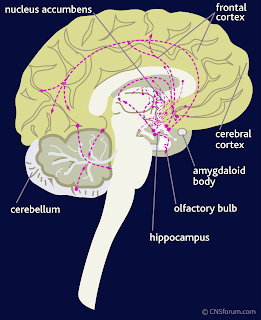Mania
Definition
Mania is characterized by excessive physical activity and a feeling of incredible joy, which overall is not comparable with the positive events that occurred.
Milder forms of mania is hypomania.
In unipolar disorder, depression occurs without the manic episode. Mania is often a part of bipolar disorder (manic-depressive illness). Some people just seem to suffer from mania, depression may actually experience episodes of mild or brief.
Both mania and hypomania are less common than depression. Mania and hypomania rather difficult to recognize; heavy and sustained sadness will encourage someone to go to the doctor, while the excitement seldom encourage someone to go to the doctor because the patient is not aware of mania that something is wrong in his mental state and behavior.
Signs and Symptoms
Manic symptoms develop rapidly within a few days. In the early stages of mania, the patient felt better than usual and often seemed more cheerful, younger and more vibrant.
Patients usually feel happy, but also can easily offended, pleased fight or openly hostile. Typical is that people believe is fine.
Lack of understanding of the situation itself is accompanied by a very unusual activity, can cause sufferers impatient, disruptive, meddlesome others and if irritability and upset about the attack.
Mental activity sooner (a condition called flight of ideas). Caution patients easily distracted and constantly moving from one theme to another theme.
Patients have false beliefs about wealth, power, skill and intelligence, and is sometimes considered themselves God.
The patient believes that he is being helped or punished by others, or have hallucinations, hear and see the things that do not exist.
The need for sleep decreases. Patients not cease to participate in various activities (eg trading business at risk, gambling or dangerous sexual behavior), without thinking about the social dangers that may occur.
In severe cases, people with physical and mental activity so frenzied that any clear relationship between mood and behavior is lost in the form of agitation without feeling (mania Delirius). In this situation required immediate action, because the patient may die from exhaustion extraordinary physical.
Symptoms of mania:
1. Mood
- Happy, irritable or hostile
- Sadness moment
2. Other psychic symptoms
- Excessive pride, boasting, feel powerful
- The mind jumping up and down, new thoughts triggered by the sound of the words, not the meaning; tend to be easily distracted
- Excessive interest towards new activities, the more in touch with the people (who often feel isolated because people meddlesome and annoying), love to shop, sexual recklessness, venture capital investment in the ridiculous
3. Psychotic symptoms
- Delusions be exceptional talent
- Delusions be outstanding physical fitness
- Delusions of riches, greatness patrician or other identity
- Hallucinations hear or see
- Paranoid
4. Physical symptoms
- The level of activity increases
- Perhaps the weight loss occurs due to the increased activity and the lack of eating
- Decreased need for sleep
- Increased sexual desire.
Share this
Disqus Comments
Alzheimer's Disease
Anthrax
Aortic Stenosis
Appendicitis
Atherosclerosis
Bronchiectasis
Bronchitis
COPD
Cirrhosis
Congenital Heart Disease
Constipation
Coronary Heart Disease
Diarrhea
Dissociative Amnesia
Diverticular Disease
Gastroenteritis
Gout
Guillain-Barre Syndrome
Hemorrhoids
Hyperthermia
Hyperthyroidism
Leukemia
Malaria
Mania
Pericarditis
Peritonitis
Placenta Previa
Prostate Cancer
Pulmonary Tuberculosis
Rheumatoid Arthritis
Syncope
Trachoma
Altered Thought Processes
Body Image Disturbance
Constipation
Decreased Cardiac Output
Deficient Fluid Volume
Diarrhea
Disturbed Sensory Perception
Disturbed Sleep Patterns
Fear
Hyperthermia
Imbalanced Nutrition Less Than Body Requirements
Impaired Gas Exchange
Ineffective Airway Clearance
Ineffective Individual Coping
Ineffective Tissue Perfusion
Knowledge Deficit
Risk for Injury
Risk for Suicide
Self Care Deficit
